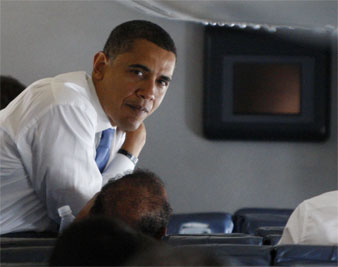
For now at least, it’s au revoir, Mrs. Clinton, though it’s possible we’ll see you again soon enough, as Obama’s pick as nominee for veep. Personally I’d much rather see him choose Chuck Hagel or Jim Webb. The nation badly needs eternal rest from the Clintons as well as the Bushes. It’s time to move on.
The night Obama clinched it, my neighbor Joe Paff called to say he thought Obama’s victory speech in St. Paul was very impressive. Joe hastily added that this didn’t mitigate his overall detestation of the evil empire and all it stands for. I’d already read Obama’s remarks online and, as so often in the past, found my eyes glazing over at all the talk of “defining moments.” I find myself resistant to Obama’s rhetorical style the same way I found listening to Tony Blair unendurable.
There was a time when Americans didn’t expect the evangelical sermonizing now required of a presidential candidate. As Gene Healy writes in the June issue of Reason, “The chief executive of the United States is no longer a mere constitutional officer charged with faithful execution of the laws. He is a soul nourisher, a hope giver, a living American talisman against hurricanes, terrorism, economic downturns, and spiritual malaise.” For Healy, the infantilism of these expectations congealed in the question a ponytailed male social worker asked Clinton, Bush Sr. and Perot in 1992: “I ask the three of you, how can we, as symbolically the children of the future president, expect the three of you to meet our needs, the needs in housing and in crime and you name it.”
Having defined himself as the candidate of change and inspirational hope, Obama’s been busy making it clear that when it comes to serious issues like the American Empire, change is parsed as running the planet with greater efficiency. A real candidate of change would announce that by the end of his first term America will have withdrawn from at least half the roughly 1,000 overseas bases it occupies, quitting the rest at the end of eight years.
Obama’s assignment these days is reassurance that, yes, he can wield the big stick, draw down troops in Iraq and redeploy them in Afghanistan, arm the Lebanese army. Take his speech to the Cuban American National Foundation in Miami on May 23: “Throughout my entire life, there has been injustice and repression in Cuba. Never, in my lifetime, have the people of Cuba known true freedom…. This is the terrible and tragic status quo that we have known for half a century–of elections that are anything but free or fair…. I won’t stand for this injustice, you will not stand for this injustice, and together we will stand up for freedom in Cuba…. I will maintain the embargo.”
Popular
"swipe left below to view more authors"Swipe →
As Fidel Castro remarked in Granma, in the wake of this oration: “Presidential candidate Obama’s speech may be formulated as follows: hunger for the nation, remittances as charitable hand-outs and visits to Cuba as propaganda for consumerism and the unsustainable way of life behind it.”
Fidel added, “José Hernandez, one of the Cuban American National Foundation directors whom Obama praises in his speech, was none other than the owner of the Caliber-50 automatic rifle, equipped with telescopic and infrared sights, which was confiscated, by chance, along with other deadly weapons while being transported by sea to Venezuela, where the Foundation had planned to assassinate the writer of these lines.”
Aside from the ritual ranting about Cuba and onslaughts on the Chávez regime in Venezuela, Obama had words of comfort for the Uribe regime in Colombia: “When I am President, we will continue the Andean Counter-Drug Program and update it to meet evolving challenges. We will fully support Colombia’s fight against the FARC. We’ll work with the government to end the reign of terror from right-wing paramilitaries. [The paramilitaries work hand in glove with the government.] We will support Colombia’s right to strike terrorists who seek safe haven across its borders.” Note the endorsement of Colombia’s foray into Ecuador to assassinate a FARC leader.
After invoking hope and change in St. Paul, Obama rushed to Washington the next day for some ritual groveling to AIPAC: “We will also use all elements of American power to pressure Iran. I will do everything in my power to prevent Iran from obtaining a nuclear weapon. Everything in my power. Everything.” Israel should get whatever it wants, and an undivided Jerusalem should be its capital.
Wishful thinkers comfort themselves with the thought that deep in the undergrowth, biding his time, is the “real” Obama, a progressive, even radical, fellow. They’re like Pascal, pondering his bet:
If I saw no signs of a divinity, I would fix myself in denial. If I saw everywhere the marks of a Creator, I would repose peacefully in faith. But seeing too much to deny Him, and too little to assure me, I am in a pitiful state, and I would wish a hundred times that if a God sustains nature It would reveal Him without ambiguity.
It’s like looking for the “real” Cressida in Shakespeare’s play, whereas in fact there are only successive Cressidas, as she refashions herself amid new circumstances. In the end Pascal said it made sense just to bet that there is a God. Democrats, despite the bleak testimony of the form sheet, make the same wager decade after decade.
The assignment of every supposed liberal on the presidential campaign trail is to engage in the task of political redefinition, so that bankers, CEOs of the Fortune 500, Rupert Murdoch, the Sulzbergers, the Grahams, the Joint Chiefs of Staff, Abe Foxman and the others all deem that candidate “safe.” Lately Obama has shown an eerie and relentless skill in these tasks of reassurance. Though necessary to a certain extent, it’s an ominous talent.


